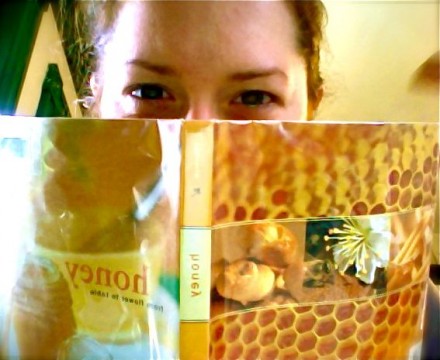Recently, we bought some Dutch Gold Orange Blossom Honey because it was on sale.
The subtle orange flavor and the sweetness of honey was enough to turn me into a bit of a honey snob.
During the kids’ chess club meeting at the library, I was perusing the food section and came across the book Honey: From Flower to Table by Stephanie Rosenbaum.
Beginning with famous instances of honey use and ending with a helpful list of resources, this well-written book was a delightful, easy read. Its pages are filled with everything from the history of honey to beekeeping to flavor-crafting your hive’s honey with different flowers to recipes (both edible and inedible!) using honey.
The photographs are beautiful. (It was a library book, otherwise I may have tried to lick the pages.) They inspired me to want to find vintage honey jars with impressions of bees and honeycombs just so that honey will hold a more prominent place in my kitchen.
Below is one of the recipes from the book I’d like to try.
Doesn’t it sounds perfectly soothing on a sore-throat day?
Hot Honey Lemonade
2 lemons
3-4 whole cloves
2 tablespoons honey, or to taste
1 cup boiling water
1 cinnamon stickSqueeze the juice of one lemon into a large mug. Slice the second lemon very thin. Poke cloves into a lemon slice and drop slices into the mug. Add the honey. Fill cup with hot water and stir with cinnamon stick until the honey has dissolved. Taste for sweetness and add more honey as necessary.
Baklava, an Ottomon Turkish puffed-pastry filled with nuts and honey, has always been a favorite dessert of mine. The last time I ate it, savoring each bite, was at a progressive Christmas dinner in 2005. Thankfully, the dinner came with a recipe list from everyone’s offerings and I was excited to discover today that I still have the binder! All this thinking about honey has made me want to make my own. Stay tuned.
Will you share your favorite honey recipe with me?
PS: You may have noticed that the disappearance of honeybees has been in the news, with things like cell phone usage and climate change cited as the culprits.
According to FastCompany.com it was discovered that the EPA knowingly allowed approval of a pesticide toxic to the natural plant pollinator, honeybees. In other words, the bees have been unwittingly dying from just doing their thing — pollinating crops. As this pollination process is important to farmers, it would seem that such a thing would be counter-productive at the very least.

